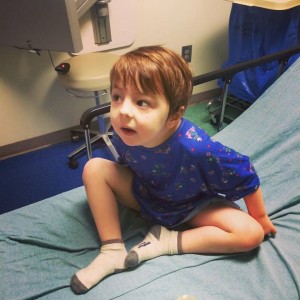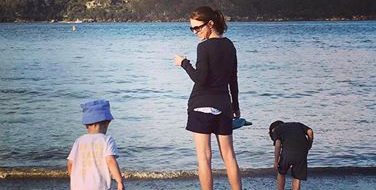 Both of my children learned to say yes before learning no. I hear this is unusual, but I know it has nothing to do with any skillful parenting on my part. If anything, it’s more evidence for the growing case that they are better people than I am–and that they’re teaching me to be everything I’m not.
Both of my children learned to say yes before learning no. I hear this is unusual, but I know it has nothing to do with any skillful parenting on my part. If anything, it’s more evidence for the growing case that they are better people than I am–and that they’re teaching me to be everything I’m not.
The Sis and her family had to say goodbye to their family dog last weekend. He’s been around since they first got married: back when they bought their first house, before they had their first child. He was my first nephew, a black bundle of sleek fur and bad breath, jumping onto me as soon as I entered their house and pissing the floor when I would bend down to pet him. We can’t believe he’s gone, even though there was fair warning. These individual griefs have a way of tapping into all the other ones we’re experiencing, have experienced, until they all coalesce into one big river that we realize is always flowing through us, joyful waters and sad intermingled because we open ourselves up to love.
It really sucks sometimes, having a heart.
“There’s a deeper music in loss,” said Pat Conroy, on an “In Memory Of” edition of NPR’s Fresh Air podcast, during which several of his interviews with Terry Gross were replayed. I’m more used to seeing his words on a page than hearing them in his voice, but both carry the scars of a life on the battlefield. Like all of our own lives. Hearing his stories, his laughter, his unmatchable wit in the face of pain, I felt the grief of losing him again, even from a remove–as a reader, not as family. I felt the grief of losing my canine nephew. I felt the grief of The Kid’s coming MRI, of needles that don’t end life but still bring pain. Of delayed understanding, and asking him to trust me when I know the pain looms larger than his faith. That, I can get.
“I believe, help my unbelief,” prayed the voice in the crowd, and how much do I love that it was our pastor’s? That we spend Sundays and life with people who are open about their brokenness, their not-enough-ness? Another thing he had said recently was that the world operates, and therefore parenting operates, under the axiom “I love you but.” I love you but you need to stop doing that. I love you but you’re not measuring up. He had said that grace reverses that order, that it can do the same for us and our children: “You did this but I love you.” I had tried it out the next week, on a walk with TK and Little Brother, when TK seemed determined to throw every article of his clothing out from the stroller and onto the street. The first time I said the words–you did this but I love you–I actually gagged a little, choking on my own inability to extend grace. He gave me plenty more opportunities to give it a shot. It’s becoming easier now, and something shifts within me each time the words are uttered. They’re not just for him, it turns out.
I believe–help my unbelief.
I had told the ladies in childcare at the gym that the MRI was coming, had teared up the day before because there are times when the river overflows. “If love is enough to get him through it, then he has that in spades,” our favorite one told me. “That little boy has so many people loving him.” And the week before at church, our friend in front of us had turned around and passed more than the peace, telling me that TK had taken her hand during Sunday school and led her to where he wanted to go. “I was so excited,” she said. “We were buddies.” This boy, whose life has often felt like time between doctor visits, he brings something out of people. Something that looks like their best: this joy over his triumphs, this solidarity in pain. I wonder, sometimes, what we would have missed if we had kept his story hidden–the weakness, the pain, the troubles. We might have just missed everything.
So I don’t hide mine. I say the words, and write them: anxiety. Guilt. Fear. I finally tell the doctor that I think I need some extra help. A pill to fall back on when the river’s water gets so high that I’m drowning. Because I’d always thought I was the one who had to find my own footing, who had to locate a branch to grab onto. I had thought I wasn’t looking, trying hard enough. I had thought the pain made me weak, but now I see it in him and I see it everywhere: that the pain isn’t what kills us. Trying to save ourselves does. And suddenly, I see life rafts everywhere, and all of them are grace: the friend who shows up at the hospital at 6 am, coffee in hand, and doesn’t leave until we’re safely headed home. I see her car pull up, delivering dinner and gifts. I see the texts and emails and messages from people I didn’t know existed a year ago. And yes, I even see a pill, because why did I for a second think there was anywhere his grace couldn’t show up, any way he wouldn’t reach down to lift me back up?
Help my unbelief…but I believe.
